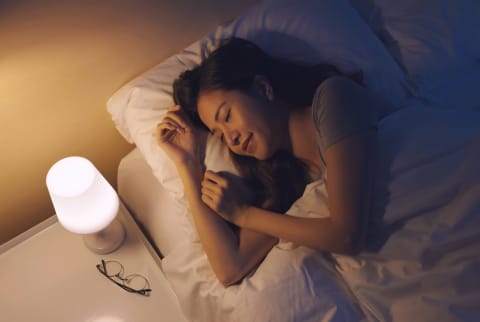As an essential part of overall well-being, sleep is something we’d all benefit from prioritizing this year. Unfortunately, fixtures of daily life—from phone screens to overhead lighting—don’t make it easy to do. Here are six habits you may have slipped into that are impacting your sleep and how to move beyond them in 2023 for the sake of shut-eye: Since we hold cellphones so close to our faces, they can be even more stimulating than other devices. “Even though the amount of light coming out of [phones] isn’t huge, it’s all going right into our eyes,” Michael Grandner, Ph.D., the director of the Sleep and Health Research Program at the University of Arizona, previously told mindbodygreen. Not to mention, phones are tiny portals to distressing news, urgent emails, and other triggers that can raise our stress levels before bed. What to do instead: Aim to turn off your phone and other electronics at least an hour before you want to be asleep in the new year. Setting a recurring “bedtime alarm” might help you adopt this new habit. Replace scrolling with journaling, reading a book that isn’t too stimulating, or writing down your to-do’s for the next day (a sleep psychologist-approved ritual!). What to do instead: To keep your internal clock running on time, aim to get plenty of light during the day and darkness at night. Get outside or sit in front of a sunlamp first thing in the morning to send a wake-up signal to your body and limit your exposure to bright lights at night when possible. Splitting your home’s lighting into bright “daytime lights” and dark, warm, dimmable “nighttime lights” is one way to do so that Steven Lockley, Ph.D., a neuroscientist at Brigham & Women’s Hospital and associate professor of medicine at Harvard Medical School, recommends. What to do instead: There are a few use cases where melatonin can be helpful for getting your sleep-wake cycle back on track, like when you’re traveling to a new time zone. But if you’re looking for a supplement to take nightly to help you sleep, you’ll want to opt for a safer, nonhormonal option like mindbodygreen’s sleep support+. Reviewers rave that the gentle yet powerful supplement helps them fall asleep noticeably faster (even when compared to melatonin), and the combination of magnesium bisglycinate, jujube, and PharmaGABA® promotes longer, deeper sleep and more refreshed mornings, too.* What to do instead: Instead of stressing about a mid-snooze wake-up (also called “middle sleep”), psychiatrist, author, and sleep expert Ellen Vora, M.D., recommends reassuring yourself that it’s normal to wake up in between sleep phases and that your body knows what to do to fall back asleep. All you have to do is relax and resist the temptation to turn on the lights or check what time it is on your phone. What to do instead: Aim to wrap up your dinner at least three hours before you plan to go to bed; bonus if it includes sleep-supporting nutrients like magnesium. This doesn’t have to mean going to bed hungry—which can also mess with sleep quality. If you feel peckish closer to bedtime, just reach for a healthy, low-sugar dessert like the ones on this list. What to do instead: Find a bedtime and wake-up time that you can realistically stick with all week long. Figuring out your sleep chronotype—or your body’s ideal natural sleep-wake timing—can help. Here’s a quiz to get you started. Emma received her B.A. in Environmental Science & Policy with a specialty in environmental communications from Duke University. In addition to penning over 1,000 mbg articles on topics from the water crisis in California to the rise of urban beekeeping, her work has appeared on Grist, Bloomberg News, Bustle, and Forbes. She’s spoken about the intersection of self-care and sustainability on podcasts and live events alongside environmental thought leaders like Marci Zaroff, Gay Browne, and Summer Rayne Oakes.



